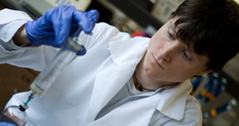Chairperson: Kyuil Kim, Ph.D., P.E.
marquette.edu/engineering/mechanical/grad.shtml
Degrees Offered
Master of Science, students are admitted under Plan A (thesis option) or Plan B (non-thesis option) is also offered; Doctor of Philosophy
Mission Statement
In embracing the missions of the university and the College of Engineering, it is the mission of the Department of Mechanical Engineering to offer high quality, up-to-date, nationally-recognized engineering programs that prepare students for successful careers. This success is marked by the graduates’ commitment to lifelong learning, a deep concern for the impact of their work on others, research that advances technical and scientific knowledge and service to professional and civic communities. The department also strives to develop students and faculty who will be recognized as exceptional in their pursuit of excellence, sense of community, spirit of collaboration and ability to define problems and accomplish goals.
Specializations
Energy Systems, Manufacturing Systems, Mechanical Systems
Program Descriptions
The Department of Mechanical Engineering offers a master’s and a doctoral program in mechanical engineering.
Course work and research in the mechanical engineering program may involve the broad fundamentals of mechanical engineering or may concentrate on one or more of the following fields: energy systems, manufacturing systems and mechanical systems. In these fields, engineering principles are applied not only to traditional equipment and methods but also to modern and emerging technologies. Typically, the engineering course work and research are augmented by laboratory studies. Although the study of advanced engineering mathematics and, often, basic science is necessary in all programs of study, the selection of subjects may vary depending upon the field of specialization and the student’s professional objectives.
Energy Systems
A concentration in energy systems typically entails advanced study of a) thermodynamics, fluid mechanics, heat and mass transfer and combustion; b) the application of these principles to phenomena and devices which constitute energy-conversion systems; and c) the analysis, simulation and design of such systems as well as plants; e.g., chemical, metallurgical, food, etc., which are energy-intensive. Current research topics include: plant optimization, fuel cells, cogeneration systems, fluid mechanics and heat transfer in surface mount technology, engine emissions/process effluents and jet engine propulsion systems.
Manufacturing Systems
A concentration in manufacturing systems engineering allows students to focus on a broad range of topics. These topics range from micro issues, such as material-related issues and cutting mechanisms in material removal processes, to macro analysis of complex manufacturing systems from either a process or ergonomics perspective. The focus of this concentration may be computer integrated manufacturing, material processing, mechanical behavior of materials, manufacturing processes, quality systems or ergonomics within manufacturing. Normally, each of these multi-disciplinary areas requires certain core courses along with specialized studies, which may include advanced courses in other engineering disciplines, courses in mathematics and statistics and/or courses in business administration. Current research topics include: cellular manufacturing, polishing and mass finishing processes, rapid prototyping, robotic systems, production integration (JIT, TQC, CIM), ergonomics of assembly operations, reliability/quality estimation, human performance and safety evaluation and materials forming and joining processes.
Mechanical Systems
A concentration in mechanical systems typically entails advanced study of a) mechanical system design and analysis and b) modeling, simulation, and control. Mechanical design and analysis focuses on the use of physical and mathematical principles to understand the behavior of mechanical systems. It includes computer-aided optimal design, such as the design of multi-body, multi-degree-of-freedom mechanical systems. Modeling, simulation and control involve the study of theoretical mechanics in conjunction with computational applications including advanced dynamics, kinematics and stress analysis. Other applications include the modeling and control of manufacturing processes, including robotics and automated deformation processing. Current research areas include: surface mount technology, composite and polymeric materials, control in automated assembly, surface finishing processes, design of compliant machine tools, metal cutting/forming mechanics, finite element methods and pressure vessels comprised of multi-layered composites.
Prerequisites for Admission
Adequate preparation in engineering, mathematics and science is required. If an applicant does not have an adequate undergraduate background, some remedial studies may be necessary, depending upon the graduate field of specialization the applicant selects.
Application Requirements
Applicants must submit, directly to the Graduate School:
- A completed online application form and fee.
- Official transcripts from all current and previous colleges/universities except Marquette.
- Three letters of recommendation.
- (For doctoral applicants only) a brief statement of purpose and copies of any published work, including master’s thesis and essays.
- (For international applicants only) a TOEFL score or other acceptable proof of English proficiency.
- GRE scores (General Test only). Waived if applicant has an undergraduate degree from Marquette with GPA of 3.000 or above.
Accelerated Bachelor’s–Master’s Degree Program
This program enables students to earn both their master of science degree in mechanical engineering and a bachelor of science degree from the College of Engineering in the span of five years. Only the thesis option is available with this program. Qualified students (3.500/4.000 GPA) who are enrolled in the Mechanical Engineering Department at Marquette University may apply for admission to this program during their undergraduate junior year. Students must submit an application to the Graduate School, indicate their interest in the five year program, and meet all other admission criteria as stated in the Application Requirements section. (GRE test scores are not required.)
Students select graduate level courses in their senior undergraduate year as their electives; these elective courses double-count toward the undergraduate and graduate degrees. However, only a maximum of 6 credit hours will apply toward the graduate degree. Upon completion of the first term as a master’s candidate, the student must petition the Graduate School to transfer courses taken as an undergraduate to the master’s degree.
Students begin their research for the thesis the summer between their junior and senior years. Their research is continued the summer between their senior and fifth years and throughout their fifth year, culminating in the preparation of a written thesis and defense.
Edit "MEEN-MS"Mechanical Engineering
A master’s student may pursue a thesis program (Plan A) or a non-thesis program (Plan B). However, students who intend to continue for the doctoral degree and those students who are receiving financial aid in the form of assistantships must select the thesis option. In Plan A, the student must complete 24 credit hours of course work, 6 credit hours of thesis work, and submit an approved thesis. In Plan B, the student must complete 33 credit hours of course work. A student in either the Plan A or the Plan B option must take a minimum of 3 credit hours of an approved math course (MEEN 6101 Advanced Engineering Analysis 1, MEEN 6102 Advanced Engineering Analysis 2, or MEEN 6103 Approximate Methods in Engineering Analysis). A minimum of one-half of the total course work requirement in both plans must be 6000-level. All students are required to take at least one-half of their total course work from the Department of Mechanical Engineering course offerings. A maximum of 6 credit hours of graduate level credit from other accredited institutions may be accepted toward the requirements of the degree. Independent study course work can account for a maximum of 3 credit hours. The student must also attend and participate in the departmental seminar and complete all university Graduate School requirements. Any exceptions to these requirements must be approved by the Graduate Committee.
Master’s Learning Outcomes
- Apply knowledge of specialized mechanical engineering concepts in engineering analysis and design in a chosen area of specialization.
- Effectively communicate ideas on design and analysis to peers, clients and customers.
- Conduct guided research in a chosen area of specialization.
Mechanical Engineering
A doctoral student must complete a program of study prepared in collaboration with their permanent adviser and outlined on an approved Doctoral Program Planning Form. This form must be submitted within the first year of the student’s doctoral studies. The program normally requires 48 credit hours of course work beyond the baccalaureate degree, plus 12 credit hours of dissertation work. In cases in which the student enters the program with a master’s degree in mechanical engineering or a closely related field, the student may request that the department and the Graduate School allow credits from the master’s degree to satisfy up to 24 credit hours of the required course work. At least one-half of the total course work requirement must be from designated graduate-level courses. Students are required to take at least one-half of their total course work from the Department of Mechanical Engineering course offerings. A maximum of 6 credit hours of graduate-level credit from other accredited institutions may be accepted toward the requirements of the degree. Independent study course work can account for a maximum of 3 credit hours. All doctoral students are required to participate in the department graduate seminar activities and complete all university Graduate School requirements.
A doctoral student must complete a departmental written proficiency exam prior to completion of the Marquette University doctoral residency requirement. This exam will be comprised of two components, one component being engineering mathematics and the other representing the student’s declared area of specialization: energy systems, manufacturing systems or mechanical systems. This examination is based upon material presented in the advanced undergraduate and master’s degree level course work (approved math courses are MEEN 6101 Advanced Engineering Analysis 1, MEEN 6102 Advanced Engineering Analysis 2 and MEEN 6103 Approximate Methods in Engineering Analysis).
A student must pass a doctoral qualifying examination (DQE) administered by their doctoral committee within one academic year after completing course work requirements. This exam must be passed at least one year prior to the submission and successful public defense of the dissertation. The dissertation must represent an original research contribution and demonstrate both high scholarly achievement and the ability to conduct independent research.
Doctoral Learning Outcomes
- Apply knowledge of advanced concepts (i.e., concepts beyond those learned during the master of science program) in engineering mathematics and two out of three areas of specializations offered in the department (mechanical systems, energy systems, manufacturing systems).
- Communicate ideas (specific to an area of specialization) via peer reviewed published and/or presented materials.
- Conduct original research in a chosen area of specialization.
On this page
- Degrees Offered
- Mission Statement
- Specializations
- Program Descriptions
- Prerequisites for Admission
- Application Requirements
- Accelerated Bachelor’s–Master’s Degree Program
- Mechanical Engineering
- Mechanical Engineering
- Courses
Engineering
- Biomedical Engineering
- Civil Engineering
- Electrical and Computer Engineering
- Engineering Management
- Healthcare Technologies Management
- Mechanical Engineering




 Warning:
Warning:








